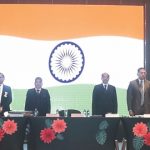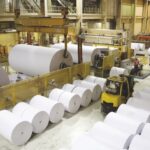
The Indian pulp and paper market is one of the world’s fastest growing pulp and paper markets. While the demand for paper is growing rapidly, the industry faces several supply-related challenges. These include, inter alia, limited availability of good quality raw materials, high cost of basic inputs, traditional technology, limited resource efficiency, improper internal water handling, solid waste disposal and effluent treatment. To address some of these key challenges, UNIDO has been supporting the Indian pulp and paper industry by facilitating exposure to and adoption of global best practices and best available technologies. The overall objective of UNIDO’s assistance to the industry is to boost the productivity and competitiveness of Indian pulp and paper mills, and therefore, raise them to a higher global competitive position.
UNIDO has adopted a systematic approach to supporting the industry: The areas of focus and scope of the technical cooperation were discussed with the Government of India. This macro-level strategy was then translated into technical interventions at the ‘meso-level’, focusing on building capacities of institutions working to support the Indian pulp and paper industry. Ultimately, UNIDO is implementing the current phase of technical interventions oriented to the micro-level, i.e. the pulp and paper mills.

In such a context, UNIDO has previously implemented a project titled “Development and adoption of appropriate technologies for enhancing productivity in the paper and pulp sector” (2015-2018) supported by the Department for Promotion of Industry and Internal Trade (DPIIT), Government of India [formerly known as the Department of Industrial Policy and Promotion (DIPP)]. The activities of the project focused on strengthening the capacities of the nodal technical institution for the industry – the Central Pulp and Paper Research Institute (CPPRI), and selected national level industry associations to provide better technical and management support to paper mills. The project comprised a detailed assessment of the Indian pulp and paper industry, based on which, capacity building programmes were undertaken, including technical workshops, international training programmes and institutional linkages with leading international institutions for continued knowledge-sharing. The project also facilitated bench-level demonstrations to adapt and customize three potential technologies to the Indian context:
- Membrane filtration technology to treat paper mill effluents
- Liquor heat treatment technology to improve the energy efficiency of the chemical recovery system in agro-based paper mills
- Ozone bleaching technology as an eco-friendly approach to produce high-quality bleach paper.
Building on this strengthened meso-level capacity under the former project and the encouraging results of the bench-level demonstrations, UNIDO is now implementing a project titled ‘Firm level demonstration of technologies and productivity enhancement for the pulp and paper industry’ (2019-2022). The project, supported by DPIIT, Government of India, comprises various interventions at the mill level and is being implemented in close cooperation with CPPRI and selected industry associations. The objective of the ongoing project is to contribute to the enhancement of the productivity and competitiveness of the Indian pulp and paper industry through two types of interventions at the mill-level: - Process optimization and productivity enhancement measures (PEMs)
a. Optimization of process parameters pertaining to technical aspects of paper production
b. Adoption of appropriate manufacturing excellence tools (such as Kaizen, 5S and TQM) - Pilot demonstration of two advanced technologies:
a. Membrane filtration: to facilitate maximum recycling of treated process water by treating paper mill effluents to reduce colour, total dissolved solids (TDS), chemical oxygen demand (COD) and other pollutants as per prescribed pollution norms
b. Black liquor heat treatment: to improve the energy efficiency of the chemical recovery system by reducing the viscosity of black liquor, which would enable the evaporation system to generate higher black liquor solids for more efficient combustion, in agro-based pulp and paper mills

This project aims to demonstrate process improvement interventions as well as the applicability of the two aforementioned technologies (membrane filtration and liquor heat treatment) in Indian paper mills using different types of raw materials (i.e. wood, agro-residues and recycled fibre), spread across the four major paper clusters in the Northern, Western, Eastern and Southern regions of the country. It is worth highlighting that the project interventions are being implemented in close cooperation with CPPRI. As the nodal technical institution for the industry, the active inputs from and involvement of CPPRI as a knowledge partner would allow for sustainability of the project’s interventions and provision of continued technology support to paper mills in India. The inputs from and participation of industry representatives is being ensured with active dialogue with national and regional level institutions. The project is also facilitating the active involvement of a consortia of leading technical institutes, universities and technology suppliers in India as well as from across the globe, such that interventions are in-keeping with global best practices and latest industry developments.
The project interventions are expected to support the Indian paper industry in improving product quality, productivity and process and resource efficiency; increased water recycling and reduced freshwater consumption and waste water discharge and ability to meet stringent discharge norms prescribed by regulatory authorities. The adoption of these technologies is aligned with various schemes of the Government of India, such as the ‘Swachh Bharat Mission’ (i.e. Clean India Mission) as well as the National Mission for Clean Ganga.
The project was initiated with a series of sensitization workshops in each of the four paper industry clusters. The objective of the workshops was to sensitize the representatives and stakeholders of the Indian paper industry regarding the objectives and planned interventions of the UNIDO paper project. The sessions of the workshops focused on the technologies to be demonstrated under the project and the productivity enhancement measures (PEMs) and sought inputs from industry representatives for the planned demonstration and dissemination activities of the project.
Workshops were conducted in Kolkata (01 October 2019), in the east; Ludhiana (04 October 2019), in the north; Vapi (15 October 2019), in the west; and Coimbatore (17 October 2019), in the south. These workshops were organized in close cooperation with CPPRI and paper industry associations at the national and regional levels such as Indian Paper Manufacturers Association (IPMA), Indian Agro and Recycled Paper Manufacturers Association (IARPMA), Indian Newsprint Manufacturers Association (INMA), Gujarat Paper Mills Association (GPMA), South India Kraft Paper Mills Association, Northern India Paper Mills Association and Kumaun-Garhwal Chamber of Commerce and Industry (KGCCI – paper chapter). The workshops also saw the valuable participation of stakeholders such as National Productivity Council (NPC), Punjab Pollution Control Board (PPCB) and Gujarat Council on Science and Technology. Participation from different types of stakeholders ensured a multifaceted discussion and comprehensive inputs for project activities.

The workshops saw active participation from paper mills from each respective cluster. Technical personnel from paper mills provided insights into the challenges faced in different unit operations and were keen to understand the applicability of the technologies being demonstrated under the project. The usefulness of the process optimisation measures was also discussed vis-à-vis the improvements in resource efficiency and productivity that could be achieved in Indian paper mills. The industry representatives highlighted the main challenges faced in paper production in India, which are, inter alia, treatment and recycling of wastewater for reuse, reduction of freshwater consumption for paper production and reduction of waste-water odour. The issues related to resource efficiency, especially energy efficiency, were also highlighted. In light of these points, the planned interventions of the UNIDO project were considered to be highly relevant and useful to the industry. The project activities were also strongly endorsed by the industry associations, since the project would facilitate focused demonstrations and technical handholding to paper mills for adoption and implementation in the Indian context. The project would also provide data for establishing the techno-economic feasibility of the identified technologies. During the discussions, several paper mills expressed interest in participating in the project activities as demonstration sites for different activities – an indication of support for the project.
Looking forward, UNIDO plans to facilitate the demonstration of the two identified technologies and productivity enhancement measures at selected mills, with the involvement of national and international experts and relevant technology suppliers, in close cooperation with CPPRI. These interventions are expected to facilitate technology uptake and firm-level innovation leading to increased productivity and competitiveness of the industry.
Authored by: Dr Rakesh Kumar Jain**, Farrukh Alimdjanov*, Vikas Kumar**, Shraddha Srikant**
* United Nations Industrial Development Organization, Vienna, Austria ** United Nations Industrial Development Organization, New Delhi, India



